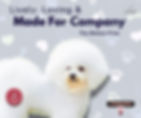Training the Bichon Frise. What Every Owner Should Know
- Paws Academy
- Sep 8, 2025
- 4 min read

The Bichon Frise is one of the most charming and people-focused dogs you’ll ever meet. With a cheerful disposition, high sociability and striking coat, this breed thrives in homes that offer affection, connection and consistent structure. While their appearance may be soft and cloud-like, the Bichon Frise has a spirited and intelligent core that benefits from clear boundaries and mental stimulation.
In this Breed Brief, we’ll look at what makes the Bichon Frise unique to train, how to support their natural tendencies and how to avoid common pitfalls with this energetic little companion.
What Is a Bichon Frise Like?
Bichons are known for their happy nature, quick wit and love for human company. These dogs are true companions who want to be wherever their people are. They are expressive, animated and carry a natural confidence when they feel secure.
Despite their small size, they are bold in personality. They often see themselves as equal members of the household and can become vocal or demanding if ignored. They enjoy attention and will use body language or sound to make their needs known.
They generally get along well with people, children and other animals, especially when socialised early.
Temperament and Behaviour
The Bichon Frise is affectionate, playful and adaptable. They can thrive in family homes, single households or apartments as long as they receive enough attention. They do not cope well with being left alone for long stretches.
Without proper stimulation and routine, they may bark excessively or become anxious. They form strong bonds with their people and need boundaries to help them feel secure.
They are friendly by nature but can be stubborn. Consistent expectations and calm communication help them stay on track.
Training a Bichon Frise
Bichons are smart and eager to please but can lose interest if training feels repetitive. They thrive in short, engaging sessions with a mix of praise, play and occasional treats. Harsh corrections or raised voices cause confusion and reduce trust.
Toilet training can take time. Be patient, use consistent routines and mark small successes. They respond well to praise when they feel safe and understood.
Teach basic cues, polite greetings and impulse control from an early age. Their enthusiasm often leads to bouncing and barking, so early boundaries help manage energy and excitement.
Group classes or well-managed play sessions can support social development and confidence.
Exercise and Enrichment
Bichons have plenty of energy and love to explore. Regular walks, interactive games and the chance to investigate new environments are important. Mental stimulation is just as valuable as physical activity.
They enjoy puzzles, scent work and learning tricks. These dogs are clever and do well when given challenges that reward their effort.
Evenings should be calmer. Routines that support winding down can help reduce overstimulation and promote better rest.
Grooming and Coat Care
The Bichon Frise has a dense, soft and curly coat that needs regular care. They are low-shedding but not low-maintenance. Brush several times per week to prevent tangles and visit a groomer every 4 to 6 weeks for coat upkeep.
Introduce grooming early with positive reinforcement. This helps build tolerance for brushing, bathing and handling. Use gentle approaches and reward calm behaviour.
Clean around the face regularly to prevent staining and check ears, nails and teeth as part of a weekly care routine.
Living with a Bichon Frise
Bichons are happiest when they feel included in daily life. They want to be near their people and take part in household routines. They are not suited to long hours alone or homes without a stable rhythm.
They do well with individuals, couples or families with respectful children. They enjoy company, structure and regular interaction.
They bring lightness and charm but need guidance and enrichment to stay balanced. They rely on clarity and calm leadership to thrive.
Are Bichon Frises Good for First-Time Owners?
Yes, as long as the owner is committed to training, grooming and emotional connection. Bichons want to understand and be understood. They need a relationship built on mutual trust and clear communication.
They are not hard to train when handled thoughtfully. If you are prepared to guide their energy, support their grooming needs and give them a voice in your home, they make a joyful and loyal companion.
Health and Care Considerations
Bichons are generally healthy but can be prone to dental disease, skin allergies and tear staining. Choose food and care products that support coat and skin health.
Because they are emotionally sensitive, they benefit from gentle handling, steady routines and quiet downtime. They need outlets for energy but also time to relax and reset.
Check for signs of overexcitement or stress. Use enrichment and calm games to help balance their busy minds.
Summary. Is the Bichon Frise Right for You?
If you are looking for a dog that loves attention, responds well to kindness and brings personality to every part of life, the Bichon Frise could be your perfect match.
They thrive on connection, routine and fun. They need guidance, enrichment and regular grooming but give back with loyalty, charm and emotional warmth.
At Paws Academy, we help companion breeds like the Bichon Frise build strong habits, calm responses and meaningful relationships with the people who love them.

